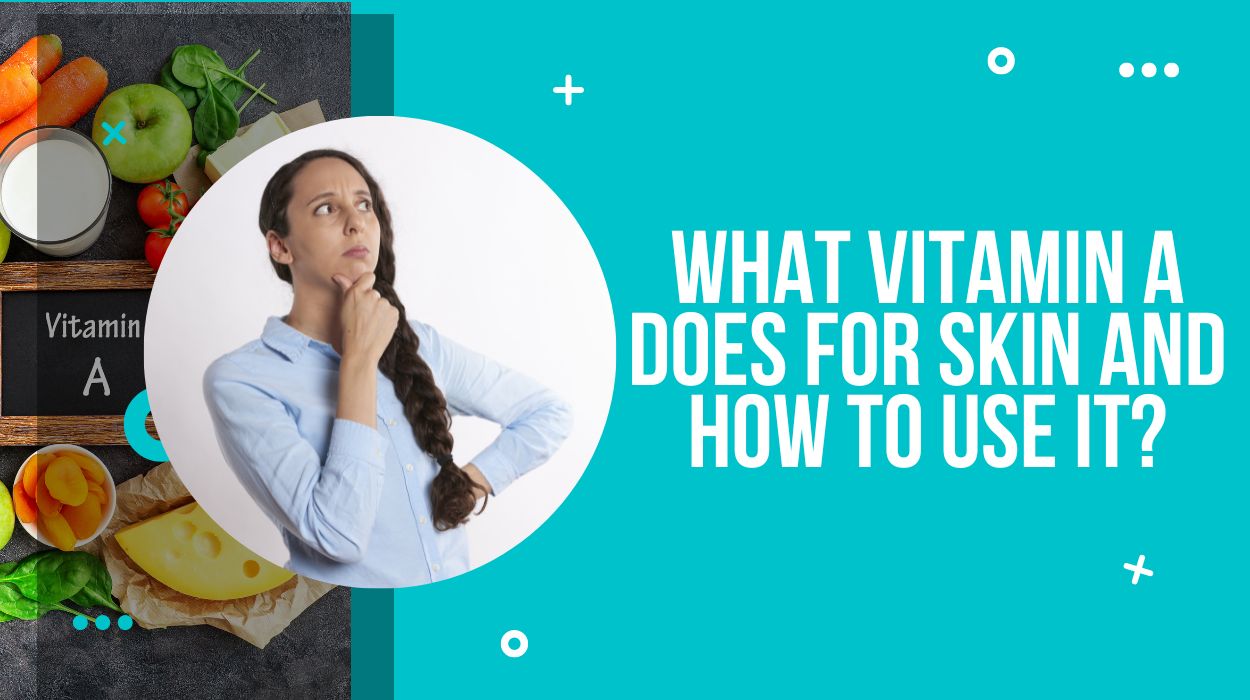Vitamins are essential for your skincare routine. They contain nutrients that provide hydration, nourishment, and balance pH levels. One such essential nutrient is Vitamin A.
Vitamin A is a one-stop solution for most skin-related issues. Using it the correct way will work like a charm.
In this article, you will learn about what Vitamin A does for your skin, along with the different ways you can use it to get the best results for your skin!
What does Vitamin A do for your skin?

When you apply Vitamin A based products on your skin, it tackles and combats the following skin problems –
- Acne
- Hyper-pigmentation
- Sun-spots
- Wrinkles
- Fine Lines
There are two types of Vitamin A – Retinoids and Carotenoids.
Retinoids are pre-formed versions of the vitamin that the skin absorbs quickly. They trigger a boost in collagen production – a component responsible for your skin’s elasticity.
Retinoids also fight free radicals that are harmful to the skin.
The American Academy of Dermatology claims that topical retinoid is an effective solution for young adolescents struggling with acne.
As for carotenoids, you can see their benefits by adding foods to your diet that contain this component. You will learn more about carotenoids as you continue reading.
How To Use Vitamin A

There are two main ways you can incorporate Vitamin A in your lifestyle for healthier skin –
- Skincare Products (for Retinoid intake)
- Food Items (for Carotenoid intake)
- Tablets and Supplements (for either Carotenoid intake or a mix of Retinoid and Carotenoid intake)
1. Skincare
Many skincare products such as facial oils, serums, under-eye creams, moisturizers, and more include retinoids.
One of the more popular forms of retinoids is Retinol, which is readily available in stores.
The other types of retinoids are – Tretinoin, Retinyl palmitate, Retinaldehyde, Tazarotene, and Adapalene.
Since Retinol is a milder form of retinoid, the final results will take longer to show up on your skin. However, it also means that it will cause almost zero side effects while using!
Before incorporating retinoid or its sub-type in your skincare routine, do a small patch test to check for any side effects or adverse reactions –
- Take a small amount of your product, preferably around one pump.
- Apply it on your jaw or lower part of the cheek every night or alternate night.
- If you do not see any redness or rashes on your skin in a week, you can start using your product as usual.
Note: If you notice your skin peel off slightly when you initially do a patch test with a new product, it is okay. However, once your skin gets used to it, it should stop. If it does not, you should stop using the product immediately as it does not suit your skin type.
Once your product has successfully passed the patch test, you can use it in your night skincare routine.
Since retinoids are strongly sensitive to UV rays, you should use these products at night.
Retinoid-based products can irritate the skin. Therefore, it is ideal to start using them slowly (thrice per week) and gradually build up as usual.
If you are conflicted between using any retinoid product and a retinol product, check your skin type and consult a dermatologist for personalized advice.
Usually, retinol products are suitable for dry or sensitive skin as they work more gently on the skin than other retinoids.
2. Foods And Other Edible Items
Another effective method to boost Vitamin A levels in your body is consuming foods containing Retinoids and Carotenoid.
Carotenoids contain high levels of antioxidants. Antioxidants help fight dead skin cells, signs of ageing and help regenerate and repair the skin itself. In turn, this improves the texture and tone of your skin.
There are four types of carotenoids, which are as follows –
- Beta-carotene
- Alfa-carotene
- Gamma-carotene
- Beta-cryptoxanthin
Before we discuss the various ways you can incorporate Vitamin A in edible form, it is essential to note that not everyone can consume them.
If you are pregnant,
Some food items that are rich in Carotenoids are –
- Carrots
- Tomatoes
- Leafy or Green Vegetables
- Mangoes
- Plums
- Apricots
- Spinach
- Yam
- Kale
- Oranges
As for Retinol, you can also consume them through various foods such as –
- Milk
- Cheese (Cheddar, Blue Cheese, etc.)
- Cottage cheese
- Fish
- Eggs
- Salmon
- Cod Liver Oil
3. Tablets and Supplements
Besides consuming fruits, vegetables, and other food items, you can also consume supplements and tablets that your doctor prescribes.
These tablets are fat-soluble, therefore amplifying the effects of Vitamin A in your body and skin. Ideally, one should take Vitamin A tablets with fat-rich foods for the best results.
It is essential to check the ingredients and dosage of the tablet you consume, as some tablets can rapidly increase their levels which can be harmful.
Some tablets have retinoids and carotenoids combined, while others contain either of the two.
However, one should be careful of the following side effects while consuming Vitamin A supplements.
- Feeling light-headed
- Blurred visions
- Blackouts
- Feeling nauseous
You May Also Like To Read:
Best Multivitamin Tablets In India
Best Vitamin B Complex Tablets in India
Best Vitamin D Tablets In India
Conclusion
Vitamin A is an essential nutrient for your skin and body. This vitamin is available in two forms – Retinoids and Carotenoids.
While you can apply different Retinoids to your skin through various products, you can eat and consume Carotenoids.
Retinoids boost collagen production that ensures elasticity for your skin and fights acne scars.
On the other hand, Carotenoids are rich in antioxidants that combat free radicals for protection against UV rays.
The bottom line is that you do require a dermatologist’s and a doctor’s opinion before using them, as they can cause harm if it does not suit you.
Did this article help you? Make sure to leave a comment or two in the comment box at the bottom.
We would love to know if you have tried incorporating different forms of Vitamin A in your skincare routine and how it helped you!
As always, we shall continue to update our blog with various natural remedies. So make sure you stick around to find updated, informative, and reliable posts!


